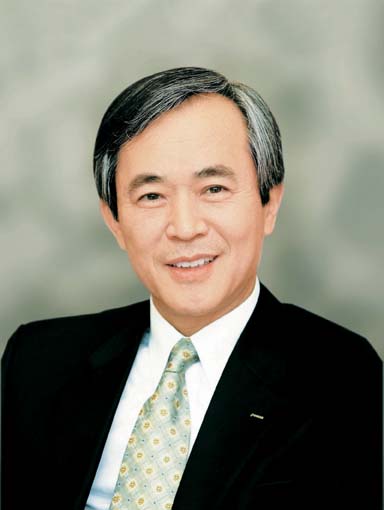POSCO's New Growth Engine
 The nation's giant steelmaker, broke ground for the construction of a fuel batteries plant at the Youngil Bay Industrial Complex on Oct. 16 with POSCO Chairman & CEO Lee Ku-taek and other dignitaries including Vice Minister Oh Young-ho of the Ministry of Commerce, Industry and Energy Ministry and Gov. Lee Kwan-yong of North Gyeongsang Province.
The nation's giant steelmaker, broke ground for the construction of a fuel batteries plant at the Youngil Bay Industrial Complex on Oct. 16 with POSCO Chairman & CEO Lee Ku-taek and other dignitaries including Vice Minister Oh Young-ho of the Ministry of Commerce, Industry and Energy Ministry and Gov. Lee Kwan-yong of North Gyeongsang Province.
The POSCO chairman, in his speech at the ceremony, said the fuel battery project is very important in light of the rising concerns over global warming and the earth's dwindling natural resources and it needs continuous investment in technological development.
For Chairman Lee, it was a truly satisfying day because he has always been preoccupied with energy and the environment as a way to keep the steel business going for a long time into the future. During a meeting with German media in Berlin, where he was attending the general meeting of the International Iron and Steel Institute (IISI), of which he was elected chairman, he told them that every CEO he met around the world was very concerned with global warming.
 The fuel battery project is not only the realization of the chairman's dream of working to prevent global warming, but is also POSCO's new growth engine.
The fuel battery project is not only the realization of the chairman's dream of working to prevent global warming, but is also POSCO's new growth engine.
On Oct. 19, he traveled to New Delhi, India, to call on Prime Minister Manmohan Singh to ask for the Indian government's cooperation with POSCO's steel production plant project on the subcontinent. Chairman Lee said the construction work on the Indian project will start on April 1 next year, the 40th anniversary of the steel giant in Korea. He added that it would happen even if 10 percent of the 16 square kilometers of land for the plant was still not yet acquired. POSCO Vice President Lee Dong-hi said the private land is located in the peripheral areas of the plant's planned location, and is not entirely necessary.
The vice president also said they expect to receive the exploration rights for the mining block from the Indian government by March next year, a crucial part of the steel mill project.
In the meantime, POSCO's Q3 operating profit amounted to 1.073 trillion won,
 exceeding the 1 trillion won mark for five quarters in a row.
exceeding the 1 trillion won mark for five quarters in a row.
At the investor relations meeting, the company said sales amounted to 5.257 trillion won in Q3, down 0.8 percentage point from the same period last year, and net profit came in at 871 billion won, down 1.2 percent YoY.
The company said the profit came from the increased sale of high value-added steel products and cost reductions. Officials said they were able to cut 242.6 billion won in costs during Q3 through process innovations, learning from reform programs such as Six Sigma and the expansion of global outsourcing.
Taking into account the slight fall in indicators of the company's operation, they readjusted their sales forecast for the year by 900 billion won and operating profit by 100 billion won from the projections made during Q2. The new sales projection is 21.3 trillion won with an operating profit of 4.5 trillion won.
Yang Ki-in, an analyst with Daewoo Securities, said the Q3 result is not bad at all considering the downtime for the No.3 blast furnace at the Gwangyang Steel Works as well as seasonal factors. He said POSCO's Q4 operating profit would climb to 1.129 trillion won with a normalization of its production activity and a turnaround in the stainless steel sector.
Chairman Lee told officials and staff of the steel complex that they should be armed with a challenging spirit. In a recent informal session of all employees, the CEO said he would see people recall challenges when they think of POSCO, as they think of Google for search and FedEx for deliveries. In the past, leaders set targets for the company and encouraged the employees to work for them. But now, Lee said, the employees should set their own targets and work for them.
Sources said the CEO wanted to make a wake up call to POSCO employees as its steel projects in India and Vietnam are about to be launched in earnest very soon.
He stressed such values as practice and speed as factors that will decide the success or failure of a company.
He also emphasized management by value, pointing to Toyota and GE as examples of successful enterprises. nw
(photos from left) POSCO Chairman Lee Ku-taek delivers his acceptance speech upon his appointment as chairman of the International Iron and Steel Institute(IISI) at its annual convention in Berlin Oct. 7.:
Dignitaries including Chairman Lee at the groundbreaking ceremony for POSCO's fuel battery plant in the Youngil Bay Industrial Complex near Pohang Oct. 16.: POSCO Chairman Lee Ku-taek.
3Fl, 292-47, Shindang 6-dong, Chung-gu, Seoul, Korea 100-456
Tel : 82-2-2235-6114 / Fax : 82-2-2235-0799